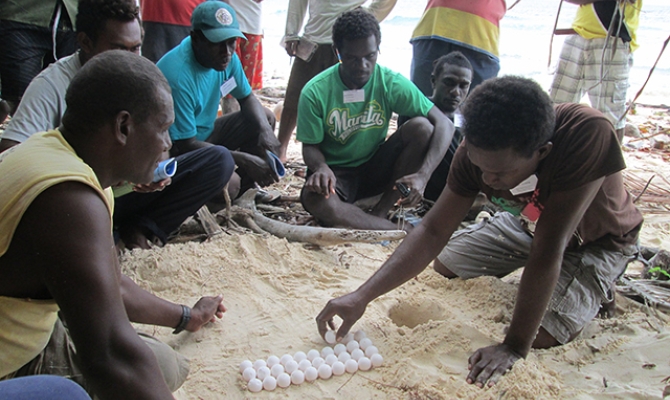
Island and Ocean Ecosystems
From April 1-5, a group of 25 community representatives involved in turtle conservation undertook specialised Turtle Monitoring training in the remote Arnavon Islands, oblivious to the flooding disaster unfolding in parts of Honiara. Located between the Manning Straits of Isabel and Choiseul Province, the Arnavon Islands is home to the Pacific's second largest nesting beach for the critically endangered hawksbill turtle.
Participants learned useful facts about turtles such as their life cycle, migration habits and identification. Also covered in the training was important information about threats to turtle populations in the Pacific region such as unsustainable harvesting for meat/eggs and handicraft; feral animal predation on turtle nests; incidental capture in commercial fishing; degradation of habitat; pollution; marine debris; boat strikes; and global warming - which may impact sex ratio, and loss of nesting beaches through sea level rise.
The field practical work included exercises in relocating turtle eggs to safer ground, releasing more than 70 green turtle hatchlings and the flipper tagging of ten juvenile turtles, which were caught by using the 'daylight-rodeo' capture method around the surrounding lagoons.
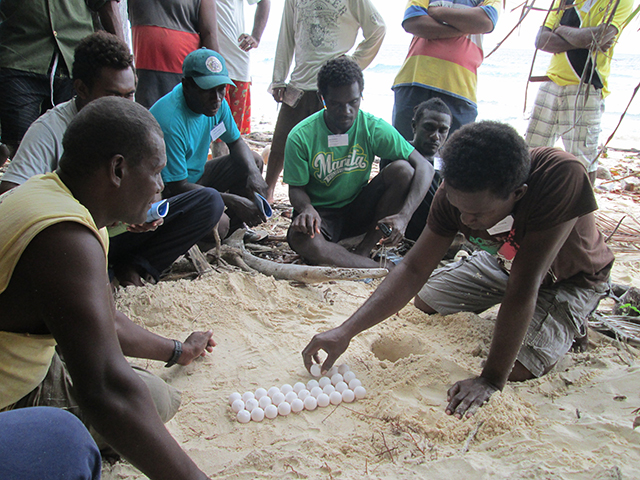
The community representatives from Haevo Khulano Integrated Conservation Area that attended the training were energised by what they had learned and have made plans after the training to reach out to other neighbouring communities with education and awareness on the importance of turtle conservation as well as to monitor their nesting beaches during the upcoming peak nesting seasons this year.
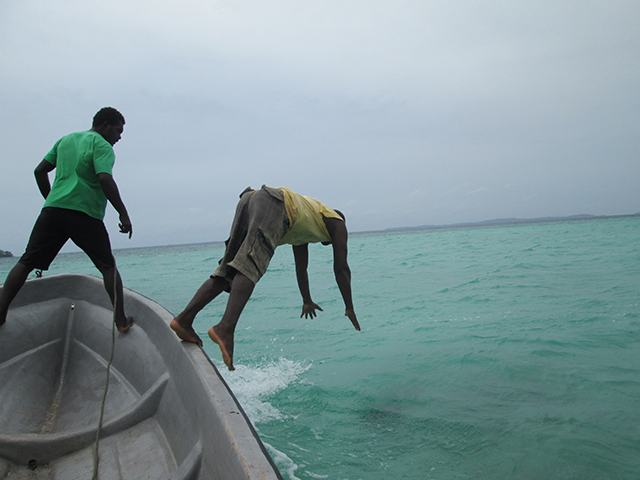
Other attendees were similarly inspired:
"I am hopeful that the egg relocation and turtle rodeo activities that we learned here could be incorporated into our eco-tourism activities," said Mr Dickson Motui of the Arnavon Community Marine Conservation Area.
"I learned new skills in turtle monitoring which adds another useful skill to my current job as a Fisheries Officer. When I go back to Marau community I would like to organise a committee to oversee the turtle monitoring project and to carry out education and awareness on marine turtles," explained Mr Patrick Haukare of the Marau Conservation Association.
"We are currently planning to conduct a turtle monitoring training for Wai-Hau foundation Conservation in Are Are, Malaita Province in the coming months and this proposed training will be facilitated by some of the Conservation Officers in attendance," said Mr Geoffery Mauriasi of Solomon Islands' Ministry of Environment, Conservation, Climate Change, Disaster Management and Meteorology.
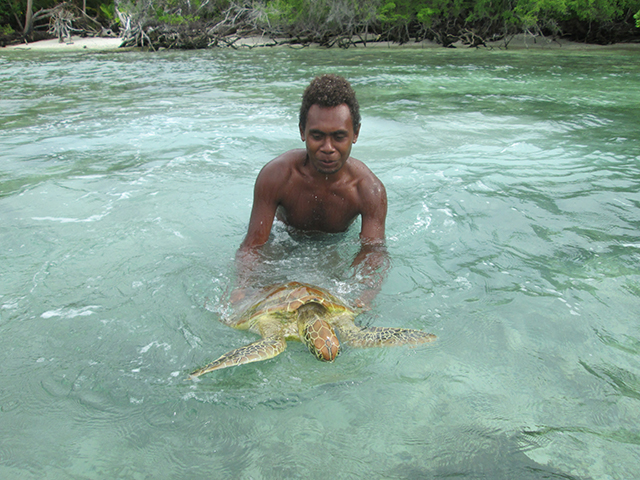
The training was conducted by Mr Duncan Limpus, Senior Technical Officer of the Queensland Government in Australia. The training is part of the four-year Turtle Monitoring and Eco-tourism Development Project, funded by the New Zealand Aid Programme and managed by the New Zealand Department of Conservation in partnership with SPREP.
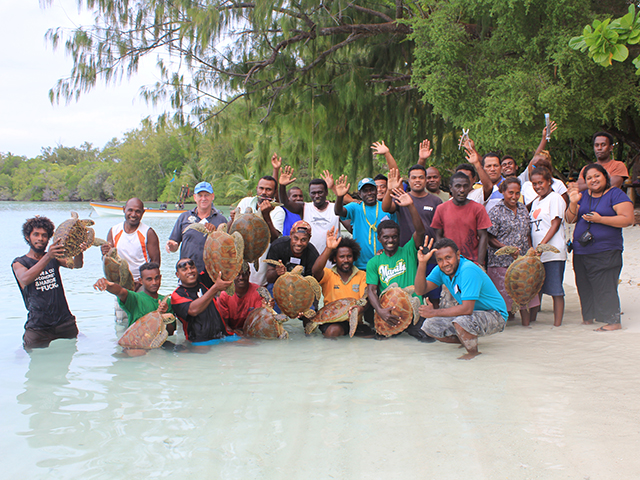
Delivered in four Pacific island countries (Fiji, Solomon Islands, Kiribati and Tonga), the project aims to enhance capacity and commitment in the Pacific region to conserve and sustainably manage endangered marine turtle populations, and to achieve increased skills, sustainable economic benefits and improved livelihoods for local communities in the region through turtle-related ecotourism activity.
For Solomon Islands, the lead implementing agency for the project is the Ministry of Environment, Climate Change, Disaster Management and Meteorology and the partners supporting this training workshop were The Nature Conservancy and Arnavon Community Marine Conservation Area.
For more information, please contact Catherine Siota.
Participants learned useful facts about turtles such as their life cycle, migration habits and identification. Also covered in the training was important information about threats to turtle populations in the Pacific region such as unsustainable harvesting for meat/eggs and handicraft; feral animal predation on turtle nests; incidental capture in commercial fishing; degradation of habitat; pollution; marine debris; boat strikes; and global warming - which may impact sex ratio, and loss of nesting beaches through sea level rise.
The field practical work included exercises in relocating turtle eggs to safer ground, releasing more than 70 green turtle hatchlings and the flipper tagging of ten juvenile turtles, which were caught by using the 'daylight-rodeo' capture method around the surrounding lagoons.

Pictured: Egg relocation exercise. Image (c) C.Siota/SPREP.
The community representatives from Haevo Khulano Integrated Conservation Area that attended the training were energised by what they had learned and have made plans after the training to reach out to other neighbouring communities with education and awareness on the importance of turtle conservation as well as to monitor their nesting beaches during the upcoming peak nesting seasons this year.

Pictured: Dickson Motui, jumping for turtles during the turtle rodeo. Image (c) C.Siota/SPREP.
Other attendees were similarly inspired:
"I am hopeful that the egg relocation and turtle rodeo activities that we learned here could be incorporated into our eco-tourism activities," said Mr Dickson Motui of the Arnavon Community Marine Conservation Area.
"I learned new skills in turtle monitoring which adds another useful skill to my current job as a Fisheries Officer. When I go back to Marau community I would like to organise a committee to oversee the turtle monitoring project and to carry out education and awareness on marine turtles," explained Mr Patrick Haukare of the Marau Conservation Association.
"We are currently planning to conduct a turtle monitoring training for Wai-Hau foundation Conservation in Are Are, Malaita Province in the coming months and this proposed training will be facilitated by some of the Conservation Officers in attendance," said Mr Geoffery Mauriasi of Solomon Islands' Ministry of Environment, Conservation, Climate Change, Disaster Management and Meteorology.

Pictured: William Miki capturing a green turtle during turtle rodeo. Image (c) C.Siota/SPREP.
The training was conducted by Mr Duncan Limpus, Senior Technical Officer of the Queensland Government in Australia. The training is part of the four-year Turtle Monitoring and Eco-tourism Development Project, funded by the New Zealand Aid Programme and managed by the New Zealand Department of Conservation in partnership with SPREP.

Pictured: Group photo of training participants after the turtle tagging exercise. Image (c) John Pita.
Delivered in four Pacific island countries (Fiji, Solomon Islands, Kiribati and Tonga), the project aims to enhance capacity and commitment in the Pacific region to conserve and sustainably manage endangered marine turtle populations, and to achieve increased skills, sustainable economic benefits and improved livelihoods for local communities in the region through turtle-related ecotourism activity.
For Solomon Islands, the lead implementing agency for the project is the Ministry of Environment, Climate Change, Disaster Management and Meteorology and the partners supporting this training workshop were The Nature Conservancy and Arnavon Community Marine Conservation Area.
For more information, please contact Catherine Siota.